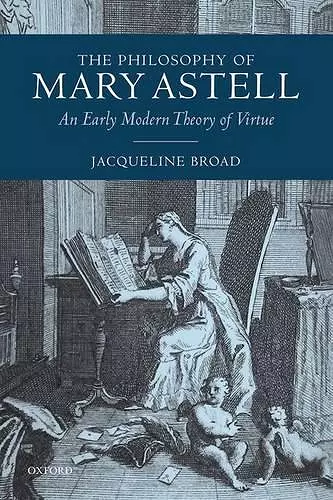The Philosophy of Mary Astell
An Early Modern Theory of Virtue
Format:Hardback
Publisher:Oxford University Press
Published:3rd Sep '15
Currently unavailable, and unfortunately no date known when it will be back

Mary Astell (1666-1731) is best known today as one of the earliest English feminists. She is also known as a Tory political pamphleteer, an Anglican apologist, an eloquent rhetorician, and an educational theorist. In this book, Jacqueline Broad interprets Astell first and foremost as a moral philosopher, or as someone committed to providing guidance on how best to live and how to attain happiness. The central claim of this work is that all the different strands of Astell's thought--her theory of knowledge, her metaphysics, her philosophy of the passions, her feminist vision, and her conservative political views--are best understood in light of her ethical objectives. To demonstrate this, Broad examines Astell's major writings and traces her programme to bring about a moral transformation of character in her fellow women. This programme draws on several key aspects of seventeenth-century philosophy, including Cartesian and Neoplatonist epistemologies, proofs for the existence of God, arguments for the immaterial soul, and theories about how to regulate the passions in accordance with reason. At the heart of Astell's philosophy, it is argued, lies a theory of virtue and guidelines on how to cultivate generosity of character, a benevolent disposition toward other people, and the virtue of moderation. This book will help readers to see Astell's feminist, political, and religious views in the context of her wider philosophical vision. It provides a rich and illuminating account of a unique female-centred contribution to the philosophy of the early modern period. It will appeal to students and scholars in philosophy, history of ideas, and gender studies.
Broad has succeeded in writing a book that will be accessible to a range of readers, from undergraduates to specialists ... I predict that it will quickly become essential reading for anyone interested in Astell's work. * Deborah Boyle, Australasian Journal of Philosophy *
Broad provides a new and highly illuminating perspective on Astell . . . a truly comprehensive analysis of Astells work. Broad has succeeded in writing a book that will be accessible to a range of readers,from undergraduates to specialists. Her lucidly written discussions of the philosophical issues at play in Astells work are clear and succinct enough to situate the newcomer, but deep enough to be of interest to readers with more background knowledge. I predict that it will quickly become essential reading for anyone interested in Astells work. It should also appeal to those interested more generally in the history of modern philosophy and the history of feminism. * Deborah Boyle, Australasian Journal of Philosophy *
Broad argues that Astell represents a distinctive female voice in ethics, since her ethical concerns are specific to women and are not represented in men's ethical writings. Instead of spending time trying to explain Astell's absence from philosophy, she shifts attention to the more positive issue of 'the implications of writing her back in.' One of the many merits of this study is that it suggests common ground between Astell's philosophy and themes of more interest to the secular present, including the question of moral freedoms, arguing that Astell finds echoes in the concerns of modern feminists ... Jacqueline Broad's study of Mary Astell takes our understanding of Astell as a philosopher to a new level and will serve as a model for the study of other female philosophers. * Sarah Hutton, Journal of the History of Philosophy *
...everyone will learn from this text, several debates about Astell are resolved in it, and Astell's philosophical status is generally elevated. * Penny Weiss, Notre Dame Philosophical Reviews Online *
ISBN: 9780198716815
Dimensions: 241mm x 162mm x 18mm
Weight: 470g
216 pages